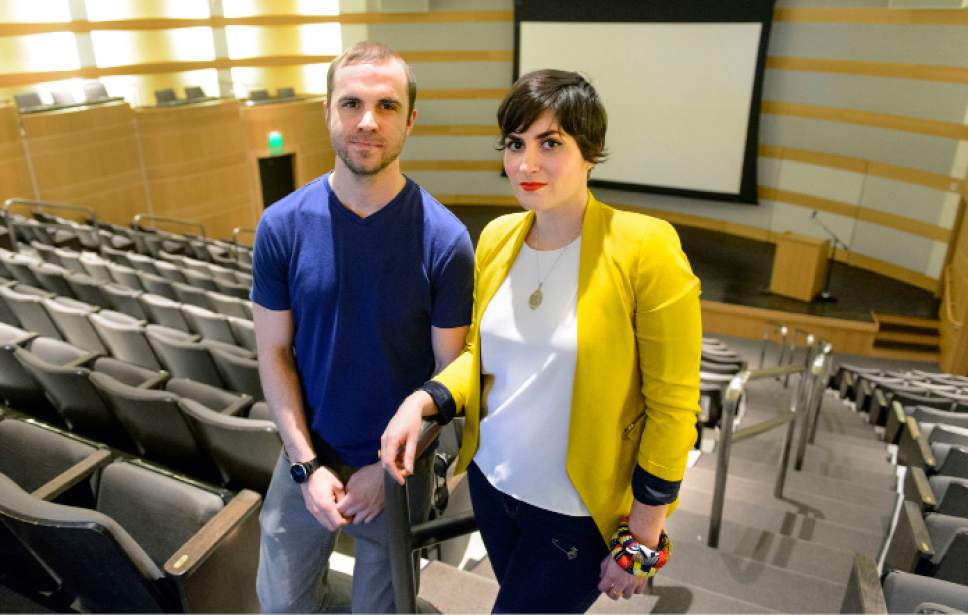This is an archived article that was published on sltrib.com in 2017, and information in the article may be outdated. It is provided only for personal research purposes and may not be reprinted.
Since the election of Donald Trump, the American Civil Liberties Union of Utah has gained record membership numbers and seen broad interest in grass-roots events meant to educate people on their rights to protest.
Card-carrying ACLU members in Utah have nearly tripled since November, growing from about 2,000 to 2,500 members per year to 6,000, as of this month, ACLU Utah spokeswoman Anna Thomas said. The numbers mirror the 98-year-old organization's nationwide membership growth since the election, though it is especially notable in conservative Utah.
Thomas said she hasn't seen such widespread interest in the ACLU since she started with the organization nine years ago. The Utah chapter has more than a dozen issues listed on its website, though criminal justice reform has been a leading topic for the local group in recent years. The ACLU teamed with Utah Republicans on a new law that reduces the sentences for minor drug crime and seeks to reduce recidivism.
The organization doesn't track Utah-specific fundraising numbers. But on a national level since the November election, the organization has raised more than $80 million, and has plans to add 100 staff members to its existing 300 employees, The Washington Post reported.
"It's just crazy," Thomas said of the Utah membership growth. "We've had more new members than we've ever had [total] members."
There is little doubt the surge in ACLU memberships is driven by policies attributed to Trump and a Republican-controlled Congress, Thomas said, though she noted the ACLU doesn't always take stances favorable to Democrats.
"We're not focused on a particular agenda. We're focused on making sure policies and practices are consistent with the Constitution," she said. "And this president has drawn a lot of ire because he keeps doing things that are blatantly unconstitutional."
On Saturday, about 220 people attended a "Resistance Training" at the Salt Lake City Public Library, which included live streaming of an ACLU town hall event in Miami. Seven other ACLU events were organized by community members in homes and libraries around the state. Nationwide, the ACLU reported 200,000 people signed up to attend about 2,300 of the livestream training events.
"It's kind of cool for the ACLU to be involved in this really grass-roots [effort] — sort of directed by our work, but owned by people on the ground," Thomas said.
Speakers in Miami explained several Trump executive orders opposed by the ACLU, discussed how and where to stage protests, and provided an overview on First Amendment rights, civil rights and other constitutional information.
The ACLU called its outreach effort "People Power," saying it aims to provide a "grass-roots mobilization platform [that] will provide ways for people to take action against the Trump administration's unconstitutional policies."
The events Saturday centered largely on Trump's executive orders impacting immigrant and refugee communities — including the travel ban for six Muslim-majority countries signed March 6.
Next up is a "freedom cities" outreach campaign where participants will talk with law enforcement and other local officials to encourage them to reject federal immigration crackdowns and other Trump administration policies, said MaríadelMar González, one of the organizers of the library event.
"It was exciting to see the energy, this positive energy," González said.
González, a self-described "full-time activist," and her co-organizer, Jeremy Davies, didn't know each other before they both realized they wanted to host one of the ACLU's Resistance Training events at the library. They decided to "join forces," said Davies, who works for a local packaging distribution company and heard about the People Power outreach on Facebook.
González said she and others are starting to plan protests, though none has yet been scheduled. She said protesters and other activists frustrated by Trump need to "pace" themselves in order to keep up momentum.
"People get discouraged by not seeing immediate results," she said. "We need to pace ourselves and not lose hope."



